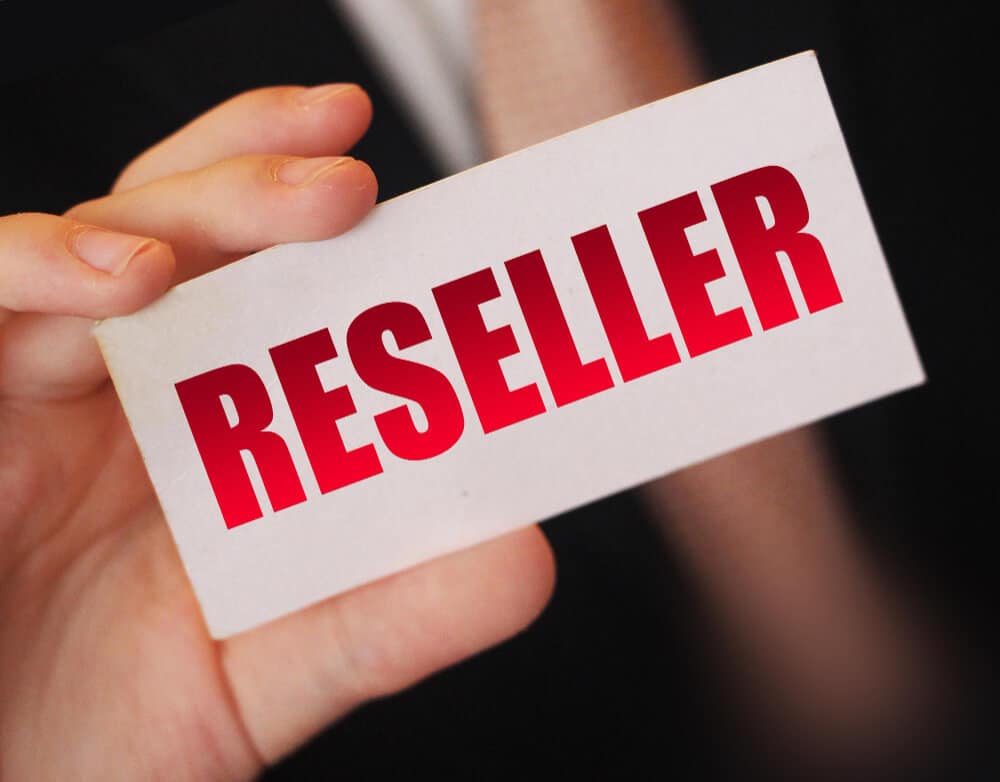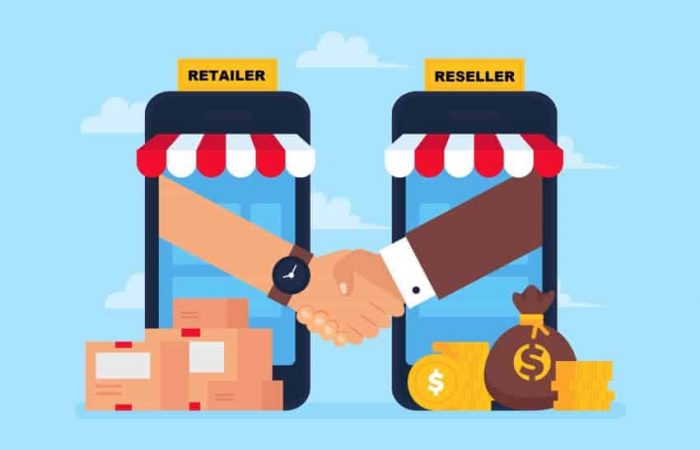Retailers and resellers are two distinct types of businesses, but they have one major thing in common: they both sell products to the public.
However, there are essential differences between the two that can impact how a company markets its goods and services.
In general, retailers buy merchandise from manufacturers or distributors for resale at their stores or website.
On the other hand, resellers purchase products from retailers to then market them under their name either online or through another retail outlet.
As such, business owners need to understand the difference between these two models if they want to make sure they’re leveraging all available opportunities for success.
With this knowledge in hand, entrepreneurs can decide which model will best serve their needs and goals when it comes time to choose a sales strategy.
Let’s find out more about retailers and resellers in detail, their differences, and how they both work.
What is a retailer?
A retailer is a business that sells products and services to customers. Retailers can be found in physical stores, online, or both.
They purchase goods from manufacturers, and other suppliers and resell them to the public at a profit.
They can also buy from wholesalers who have proper wholesale licenses to operate in the market legally.
Retailers are an important part of the supply chain because they bring consumer goods to consumers and ultimately drive sales and profits.
Retailers play a vital role in the economy, as they make it possible for people to purchase the goods that they need to make their lives better.
Retailers also help stimulate demand by providing a wide array of products and services to choose from. Without retailers, consumers would have much more difficulty finding what they need or want.
Retailers also provide jobs for people in their communities and help to support the local economy.
Retailers come in all shapes and sizes, some are small, family-owned businesses while others are large national chains that are part of huge corporate conglomerates.
No matter what type of retailer they may be, they all strive to provide quality goods and services to their customers.
Also Read: Checklist for Opening Your Dream Salon

Streamline your business with Octopos– A Complete POS System with Big Boys Tools without the Big Price
It is a lot more than a point of sale. Octopos is easy and intuitive for you and your staff to use. Yet you get all these sophisticated tools to manage inventory, track and engage customers, get meaningful insights into your business, and much more.
Understanding how retailers work
First and foremost, retailers must be knowledgeable about their products and services.
They need to know the features, pricing, availability, and quality of the goods they are selling to provide their customers with the best possible shopping experience.
Retailers also must understand consumer behavior to make sure they have the right products at the right time for the right price.
They need to be able to anticipate customer needs and have the flexibility to adjust their merchandise selection as needed.
Retailers get their supplies mostly from wholesalers or manufacturers and must have a good understanding of the supply chain.
They need to know how long it will take for products to be restocked if they are out of stock and how to get the best deals on merchandise.
To succeed as a retailer, you also need excellent customer service skills. Retailers should be friendly, attentive, and knowledgeable about the products they are offering.
They should be able to explain product features and help customers make informed purchasing decisions.

What is a reseller?
A reseller is a bit different than a retailer – as the name suggests, they resell products and services that were originally sold by other companies.
Resellers purchase goods from retailers, manufacturers, wholesalers, or other suppliers at a discounted rate and then mark them up to sell to their customers.
The key difference between a retailer and a reseller is that the reseller does not typically own the product or service they are selling. They are, instead, acting as a middleman to connect the original supplier to the end customer.
Resellers can range from large corporate conglomerates to small family-owned businesses that specialize in certain product lines or services.
Reselling is a great way for entrepreneurs and small business owners to get into the retail market without having to invest in inventory or marketing.
The success of a reseller depends on their ability to find the right supplier, negotiate favorable terms, and manage customer relationships.
It’s also important for them to understand their target audience so they can tailor their products and services accordingly.
Like retailers, resellers are an important part of the supply chain and can help stimulate demand by bringing products to consumers at a reasonable price.
Understanding how resellers work
Overall, resellers play an important role in the economy by connecting customers with products and services that they need.
They have to be savvy negotiators who can find reliable suppliers at a discount so they can offer their customers competitive prices.
Resellers must also be knowledgeable about the products and services they are selling to provide the best customer service possible.
This includes being able to answer questions, offer advice and suggestions on products, and explain the features and benefits of what they’re offering.
In simple words, resellers act as intermediaries between suppliers and customers.
They are responsible for sourcing the products and services, negotiating prices, marketing the product or service to potential customers, providing customer support, and managing relationships with suppliers.
By working closely with both suppliers and customers, resellers can help facilitate a smooth transaction process and ensure that everyone’s needs are being met.

Major Differences between Retailer vs Reseller
So now that we know what both a retailer and a reseller are, let’s take a look at the key differences between them.
1. Product source
When it comes to retailers, products are mainly sourced from manufacturers, wholesalers, and brand owners.
This means that retailers are the ones who actually purchase items from manufacturers, store them, and then sell them to customers.
Retailers also need cash registers and POS systems to carry out transactions and keep track of their inventory.
So it’s better to understand the key differences between cash registers and POS systems to make the most out of them.
On the other hand, resellers are typically not in direct contact with manufacturers, as they mainly buy products from retailers and then resell them to consumers at a markup.
This means that they don’t necessarily have to purchase items from manufacturers, but instead can buy them from other retailers and then resell them.
2. Buyers
Another difference between retailers and resellers is who they are selling to. Retailers sell their products directly to consumers, while resellers offer their services to other businesses for a commission or markup.
Essentially, this means that retailers are typically focused on providing goods and services to the general public, while resellers aim to help businesses with their purchasing needs.
In this case, retailers are targeting individual consumers, while resellers focus on other businesses and organizations.

3. Profit margins
The profit margins of retailers and resellers also differ significantly depending on their business model and the products they are selling.
Generally speaking, retailers tend to make more profit per product compared to resellers because they can directly purchase items from manufacturers at a lower cost than resellers who buy products from retailers.
However, resellers typically make more overall profits due to their ability to buy in bulk and sell at a markup. Additionally, they don’t have to worry about the costs associated with operating a physical store, like rent and staff wages.
4. Type of products
Retailers typically specialize in selling specific items or product categories, while resellers are more likely to sell a variety of products from different suppliers.
This means that retailers usually have fewer options when it comes to the types of products they can offer, while resellers may be able to provide customers with a wide range of goods and services.
So when it comes to variety and choice, resellers usually have the upper hand.
5. Physical Store
Retailers are typically associated with both physical stores and online shops, while resellers usually do not operate a physical store.
So retailers can be in touch with their customers on a more personal level, while resellers mainly focus on online sales.
This also means, retailers also have to pay rent, salaries, and other operating costs associated with running a physical store.
6. Ownership
Retailers can be either private individuals or large corporations. Resellers, on the other hand, can be both self-employed and small business owners.
Retail business is somewhat safe but requires a large investment. Resellers have the advantage of being able to start their business with a smaller capital investment, while still having the potential to achieve high profits.
So when it comes to ownership, it comes down to personal preference and the amount of capital available.
7. Direct links
When it comes to linking with other businesses and individuals, retailers are more likely to be directly linked with manufacturers and distributors as well as customers, while resellers are linked with anyone in the trade cycle.
This means that retailers are in direct contact with the people and businesses who supply them with their goods, while resellers will mostly be dealing with other buyers or sellers.
Table of Comparison
| Differences | Retailers | Resalers |
| Product source | Wholesalers and manufacturers | From other retailers and sell it to someone else |
| Target market | Consumers and resellers | Anyone linked with the product chain |
| Physical presence | Available in both brick and motor stores as well as online stores | Available mostly in online stores |
| Ownership | Mostly owned by large corporations | Small business owners |
| Links between | Consumer and manufacturer | Anyone in the trade chain |
| Profits | Makes more profit | Makes profits as much as small businesses |
Conclusion
So there you have it! Retailers and resellers are two distinct types of businesses with different objectives, customer bases, profit margins, product offerings, etc… By understanding the differences between the two, you’ll be better positioned to make a decision on which is best for your business.

